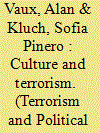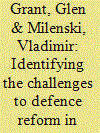| Srl | Item |
| 1 |
ID:
152874


|
|
|
|
|
| Summary/Abstract |
The relationship between terrorism and culture was systematically examined using three high-quality global databases. Contrary to prior research, terrorism—collapsed across form and era—was not related to any of Hofstede's cultural dimensions. Yet, particular forms of terrorism—incidents involving substantial casualties and damage, suicide bombings, and the proportion of incidents involving fatalities—all showed relationships with cultural dimensions. Tolerance of terrorism and relative tolerance of the 9/11 attack were related to cultural dimensions and terrorist events. Finally, populations that were relatively voiceless, disengaged from their communities, suffering, angry, and hopeless showed more tolerance of terrorism and incidents of terrorism.
|
|
|
|
|
|
|
|
|
|
|
|
|
|
|
|
| 2 |
ID:
161005


|
|
|
|
|
| Summary/Abstract |
The authors have over 50 years' experience of working on defence in Central and Eastern Europe. They have been intimately involved in trying to reform over 10 national defence organisations including Ukraine. During this work, they often faced intractable resistance and scepticism or conversely, apparent unbounded support, but following this, a complete lack of any actual implementation work by officials. This paper addresses some of the findings and observations identified by the authors that appear to cause these responses and the consequent failure of reform. A new research approach has been taken by using the business and culture tools from Schein, Hofstede and Kotter to try and unravel the underlying causality of that failure. The second part of the paper produces a new process for change based upon the research conclusions to help other advisers and consultants working on reform in the post communist defence arena.
|
|
|
|
|
|
|
|
|
|
|
|
|
|
|
|